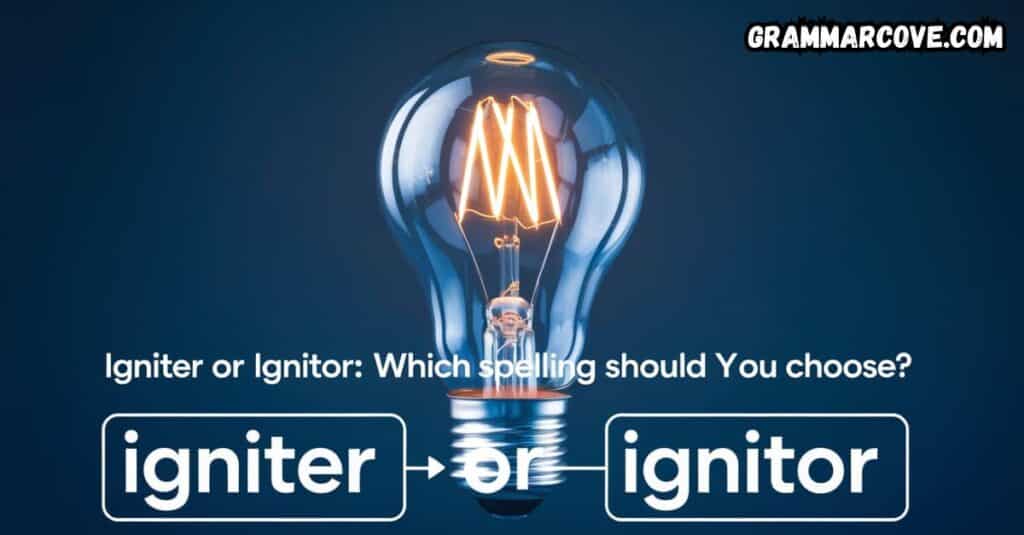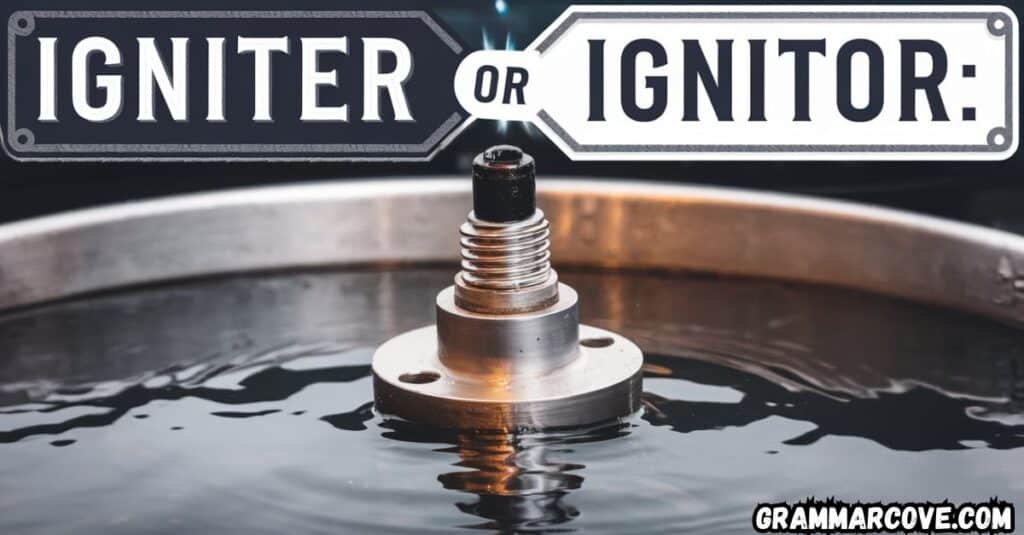When it comes to writing, English can often be a tricky language to navigate. Many words, though similar, have different spellings, and choosing the right one can sometimes feel like a guessing game. Take “igniter” and “ignitor” for example. These two words both refer to the same thing: a device used to start a fire, spark an engine, or ignite some kind of process. Similarly, when working with an AI image generator, small choices can make a big difference in the output. However, which option should you choose? Should you use “igniter” or “ignitor”?
In this article, we’ll break down the differences between these two spellings and provide some helpful guidance on when to use each. Whether you’re drafting an email, writing a technical manual, or simply curious about the correct spelling, we’ve got you covered. Let’s dive into the details of igniter vs ignitor.
Understanding “Igniter” vs “Ignitor”
Before diving into practical usage, it’s important to understand that both igniter and ignitor are technically correct. The difference is more about spelling preferences than meaning. However, there are some subtle distinctions in how they’re used in different contexts.
The Case for “Igniter”
The spelling “igniter” is more commonly used in modern English, particularly in American English. It’s the form you’re likely to see in technical literature, product descriptions, and everyday use. In fact, many major dictionaries list “igniter” as the more standard spelling.
Example:
Imagine you’re writing a technical manual for a new automobile engine. You might write:
- “The igniter in this engine ensures quick and reliable ignition of the fuel mixture, providing better fuel efficiency.”
In this scenario, “igniter” is the preferred choice because it aligns with the common usage found in engineering and automotive texts. “Igniter” flows naturally in technical writing, making it the go-to choice for professionals in these fields.
The Case for “Ignitor”
While “ignitor” is less common, it’s still a valid and recognized form. In some cases, it might be used to give a slightly more formal or technical feel to the language, though this is rare.
Example:
Let’s say you’re writing an email to a client regarding a sensitive equipment part:
- “Dear Mr. Jenkins,
Please find the detailed specifications for the ignitor that we discussed. The ignitor is designed to provide consistent sparks, crucial for your machine’s operation.”
Here, “ignitor” might be chosen to give the text a more formal tone, or it could just be a matter of the writer’s personal preference. It’s also possible that in some niche industries, the term “ignitor” is more commonly used, although this is less typical.

Key Differences: Igniter or Ignitor?
If you’re wondering whether there’s a significant difference between igniter vs ignitor, the simple answer is no—they both refer to the same thing. The only real distinction is that “igniter” tends to be used more frequently and is more widely accepted, especially in the United States.
Here’s a breakdown:
| Feature | Igniter | Ignitor |
|---|---|---|
| Common Usage | More widely used | Less common, formal tone |
| Preferred Region | Mostly American English | British English (sometimes) |
| Typical Context | Technical, everyday use | Formal technical, niche fields |
| Ease of Use | More common and easier to remember | Less intuitive, more formal |
| Dictionary Entry | Most major dictionaries list this first | Recognized, but not as prominent |
When to Use “Igniter”
You’ll most often see “igniter” in contexts related to everyday or technical language. Whether you’re working on a project in automotive engineering, home appliances, or electrical components, “igniter” is your go-to spelling.
Example Scenario:
Suppose you’re a product designer, and you’re drafting an email to your supervisor about a new gas stove design.
Email Example:
Subject: Updates on Gas Stove Design – Igniter System
Dear Sarah,
I hope you’re doing well. I wanted to update you on the progress of the new gas stove we’re designing. We’ve decided to integrate an igniter system that uses a piezoelectric spark. This system is designed to offer quick, reliable ignition, which will enhance the customer experience.
I’ve attached a PDF with all the specifications for your review. Let me know if you’d like to discuss it further.
Best regards,
Tom
In this email, the “igniter” spelling is used because it’s the standard form for this product context. It’s clear, easy to understand, and most people would recognize the term immediately.
When to Use “Ignitor”
In contrast, “ignitor” is more likely to appear in formal, technical writing or in certain British English contexts, though even then, it’s not necessarily the most common form. It’s a slightly older variant, and while not wrong, it may come across as more formal or specialized.
Example Scenario:
Let’s say you’re writing a formal proposal for an industrial equipment supplier about a new ignition system. In this case, you may use “ignitor” to align with the more technical tone.
Email Example:
Subject: Proposal for Ignition System Upgrade
Dear Mr. Wilson,
Thank you for your interest in our ignition system solutions. As requested, I’ve attached a detailed proposal outlining the ignitor specifications for the new generator model. The ignitor system is engineered to reduce ignition failures, ensuring consistent and reliable operation.
Please feel free to reach out if you need additional details.
Best regards,
Emma
In this email, the use of “ignitor” helps create a more formal tone, which might be appropriate in high-level discussions or in industries that often use more traditional or specialized terminology.
The Global Perspective: Igniter or Ignitor?
While “igniter” is more commonly used in American English, “ignitor” tends to appear more frequently in British English. However, this difference isn’t rigid, and many British publications and professionals will still use “igniter” due to its wider acceptance.
For example, a UK-based engineering firm might use “ignitor” in the design and maintenance of their machinery, but their American counterparts might prefer “igniter.”
Global Usage Example
Suppose you’re working with an international team of engineers, with members based in both the US and the UK. In a collaborative project, the spelling might vary depending on the team member’s location or preference.
Project Documentation Example:
Title: Specifications for the New Ignition System
In the US Version:
“The igniter in the new system will provide reliable sparks for ignition.”
In the UK Version:
“The ignitor is designed to improve ignition efficiency.”
In this scenario, both spellings work, but the regional differences in spelling might be noticeable.
Conclusion: Igniter or Ignitor?
To sum it up, “igniter” is generally the safer choice for most writing, especially in technical and everyday contexts. It’s the more widely accepted spelling, especially in American English, and is used across a variety of industries. On the other hand, “ignitor” might still appear in more formal or niche technical writing, though it is less commonly used.
So next time you’re wondering whether to spell it “igniter” or “ignitor,” remember that both are technically correct. It just comes down to the context in which you’re writing and the tone you wish to convey. Whether you’re working on a casual product description or drafting a formal proposal, choosing the right spelling can make all the difference.
In the end, the key takeaway is that “igniter” tends to be the more popular and versatile choice, while “ignitor” might still be appropriate in certain formal or specialized contexts. Just keep your audience and tone in mind, and you’ll make the right call!


